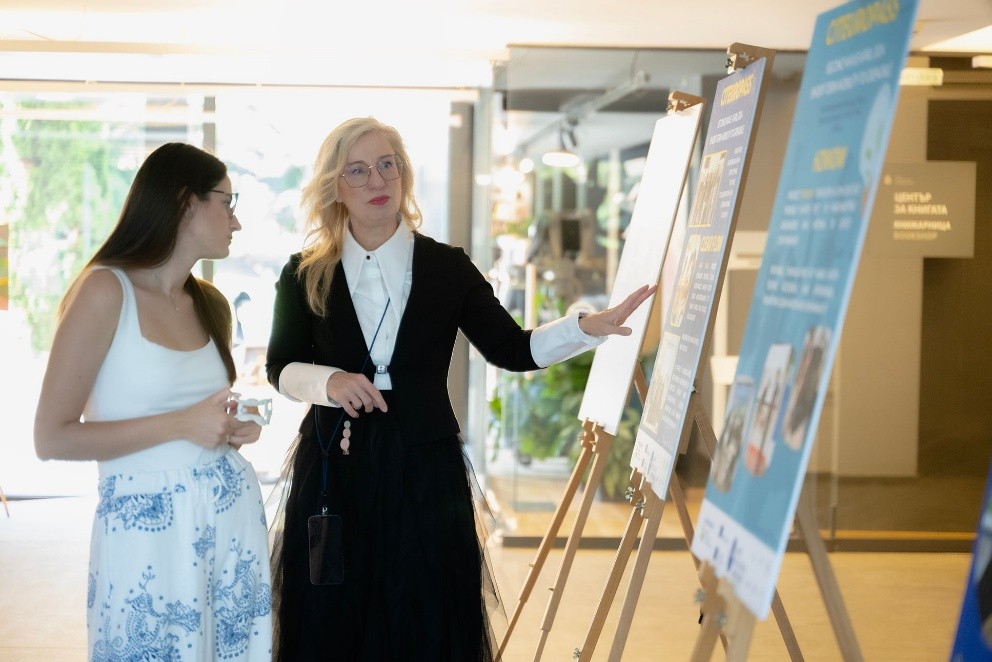Abstract: New Bulgarian University (NBU) used HEInnovate to evaluate and improve its entrepreneurial ecosystem. Involving students and faculty, the tool helped identify current activities, inspire new ideas, and encourage reflection. It boosted teamwork within the university, project-based additional initiatives and connections with Sofia’s startup community. HEInnovate was more than a diagnostic tool — it sparked cultural alignment and more purposeful complimentary activities across NBU.
What is your role and what is the context of your institution?
I am Juliana Vassileva, an Associate Professor at New Bulgarian University (NBU), where I teach and research entrepreneurship, innovation, competitiveness, digital transformation, and AI in business. NBU is Bulgaria’s largest private university, founded over 30 years ago. We value our liberal education model and active role in European networks like ERUA – the European Reform University Alliance. NBU encourages entrepreneurship through a culture of openness, interdisciplinarity, and creativity, seen in student projects, faculty work, and informal learning spaces and interactions.
years ago. We value our liberal education model and active role in European networks like ERUA – the European Reform University Alliance. NBU encourages entrepreneurship through a culture of openness, interdisciplinarity, and creativity, seen in student projects, faculty work, and informal learning spaces and interactions.
How did New Bulgarian University start using HEInnovate, who was involved, and what initial benefits did it bring?
HEInnovate came to New Bulgarian University at the right moment, helping us structure conversations, connect initiatives, and inspire new ones. Drawing on previous case studies, we applied the tool using a group-based participatory model, involving students — mainly from business and entrepreneurship programmes — and faculty from various departments, especially business, economics, and innovation. Participation was voluntary, and the process was inclusive and constructive. Uniquely, students were asked to write reflective essays on all eight HEInnovate dimensions, turning the assessment into a powerful pedagogical exercise that promoted critical thinking and engagement. We also linked the results to the GUESSS (Global University Entrepreneurial Spirit Students’ Survey) survey, creating a more holistic learning experience. HEInnovate helped us recognise the breadth of our entrepreneurial activities and consider how to build on them further. We used HEInnovate results, along with GUESSS data and other inputs, as the basis for a scientific paper on the entrepreneurial university model, written with a colleague from Africa to compare the practices and the outcomes. It was presented at the International Week of Francophone Scientific Research in Quebec, Canada. Evaluating each HEInnovate dimension helped us develop a more precise understanding of our university's context.
How did HEInnovate help you reflect on and strengthen your existing entrepreneurial activities within the broader culture of your institution?
HEInnovate enabled valuable structured reflection and provided a shared language to describe our entrepreneurial efforts. It highlighted students’ strong entrepreneurial intentions and helped us better appreciate our open, interdisciplinary, and project-based approach. Students feel confident sharing business ideas with faculty, and many of our projects offer labs, simulations, and pitching opportunities. HEInnovate helped us map and connect existing initiatives, sparked new ones — like student-led projects, mentoring schemes and international collaboration, including Startup Bootcamps — and validated the efforts of individuals across the university. Our bottom-up culture plays a key role: faculty are proactive mentors, and students are eager to experiment, collaborate internationally, and apply digital tools. For example, we have Erasmus+ project Citeuropass with colleagues in France, Slovakia, and Romania, working to enhance students’ skills—like trainings on European citizenship, EU entrepreneurship and EU frugal innovations, prototyping, laboratory work and pitching. HEInnovate fits naturally into this dynamic, growth-oriented environment.
Did HEInnovate help identify any challenges/gaps or areas for growth?
We identified several gaps and challenges that need further analysis to find the best solutions for our context. Students said it’s easy to get feedback from lecturers but noted that those in other disciplines, without close ties to business and entrepreneurship faculty, are at a disadvantage. Many suggested creating a university-wide support system, like entrepreneurship centres, clubs, incubators, or accelerators. We also found strong links to Sofia’s entrepreneurial ecosystem, which benefits students through competitions, tech park programs, and funding — resources not yet available internally. Faculty feedback called for more systematic efforts to embed entrepreneurship across the university, both strategically and operationally. Interestingly, the faculty were more critical than students, who already see the university as quite entrepreneurial. We learned that HEInnovate is not just a diagnostic tool — it is a conversation starter. One major lesson: instit utional culture matters more than structure. While bottom-up enthusiasm drives change, there is still a need for top-down support to scale. Student feedback and proactivity are vital compasses for progress.
utional culture matters more than structure. While bottom-up enthusiasm drives change, there is still a need for top-down support to scale. Student feedback and proactivity are vital compasses for progress.
What are the next steps for your university in continuing the entrepreneurial journey supported by HEInnovate?
The momentum continues. We’re working to better connect entrepreneurial efforts across departments, make support more visible and accessible, and create more intentional spaces — both virtual and physical — for entrepreneurship to thrive. We plan to repeat the HEInnovate assessment in Academic 2025/2026 to track our ecosystem’s progress. I’ve already talked with colleagues about doing this together to identify strengths and challenges collaboratively. HEInnovate didn’t just assess us — it inspired us. It gave us insight, energy, and clarity, helping us see our strengths and imagine what more we can achieve. In a grassroots-driven environment, this tool helps create alignment and motivation.


